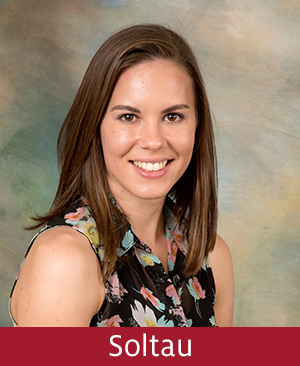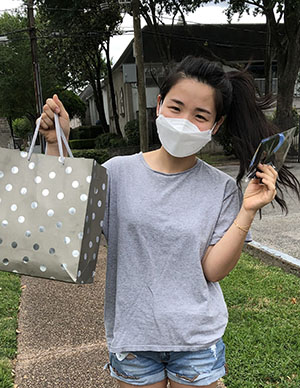Student News
Pandemic Relief for Homeless
Pharm.D. Student Spearheads Fundraiser for Meals, PPE Drive for Houston's Homeless
June 16 — As a volunteer at a homeless ambulatory care clinic for nearly three years, UH College of Pharmacy Pharm.D. student Rhea Soltau has gained in-depth awareness of the everyday challenges faced by the homeless population in Houston. As businesses and social service organizations that members of the homeless community rely upon suspended their normal operations due to the COVID-19 pandemic safety measures starting in mid-March, Soltau knew the population's needs would only be magnified by the sudden absence of essential services and provisions.
The mantra of "Stay Home, Stay Safe" doesn't mean much if one doesn't have a home, Soltau said.
"It's a matter of putting yourself in their shoes, and realize, 'What would I do or where would I go if I didn't have a home and access to basic necessities as food, clean water, soap, or even somewhere to sleep in light of the safety concerns about staying at a shelter?" Soltau said.
 Soltau has been working with Houston's homeless population first as a first-year volunteer pharmacy student, then as a member of the executive board of the multidisciplinary student-run H.O.M.E.S. Clinic, which has offered free health care services to the homeless from UHCOP pharmacy and UTHealth and Baylor College of Medicine medical students and attending preceptors since 1999.
Soltau has been working with Houston's homeless population first as a first-year volunteer pharmacy student, then as a member of the executive board of the multidisciplinary student-run H.O.M.E.S. Clinic, which has offered free health care services to the homeless from UHCOP pharmacy and UTHealth and Baylor College of Medicine medical students and attending preceptors since 1999.
As pharmacy coursework had transitioned to online instruction and the H.O.M.E.S. Clinic temporarily halted patient intake, Soltau connected with the leadership of The Beacon, a nonprofit social services organization housed in the same building as the clinic and frequent partner on initiatives for their shared target population.
"The Beacon had gone from providing about 200 meals per day to 600 meals per day," Soltau said. "We're also experiencing an influx of homeless from outside of Houston, so the need has been amplified. What made it even more challenging was that, under normal circumstances, they are able to get food donated from restaurants and event venues, but that support really declined as those businesses shut down.
"Using their existing crowdfunding platform, we were able to raise more than $1,600 in four days by reaching out by word of mouth and social media."

Soltau and her colleagues then turned their attention to addressing other unmet needs in the community: personal protective equipment, including masks; hygiene kits, including soap and hand sanitizer; water and snacks; clothing; and other essential items.
"The Beacon's supplies started to run out quickly, especially with the difficult-to-find items like masks, gloves and sanitizer," she said. "We set up no-contact drop-off sites at some apartment communities and schools, and have had a great response. We've dropped off about two carloads of roughly 300 items so far."
Soltau also connected with Causey Coffield, a volunteer with the Houston Order of Malta, to sew about 60 masks per week with fabric donated by a crafts store. Mask recipients receive coffee filters to increase the effectiveness as well as instructions on how to wash the masks.
Through her experience at H.O.M.E.S. and undertaking the recent pandemic assistance initiative, Soltau said she's become more determined to utilize her pharmacy skills and knowledge in the ambulatory care, public health and administration arenas.
"Pharmacists are really good at looking at alternatives, whether it's a medication that may be less expensive or have fewer side effects, so I think pharmacists can be a greater asset during large-scale emergencies," Soltau said.